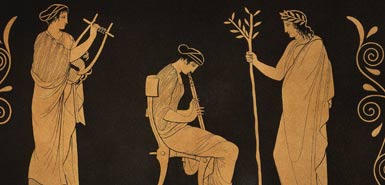Narrator: Listen to part of a lecture in a music class.
聽一段音樂課程。
Professor: Today we are going to do something a little different.
今天我們來做些不同的事。
In the past few classes, we've listened to traditional music from around the world and we've talked about the characteristics of these music, what makes these styles distinctive, what kinds of instruments are used.
之前幾節課,我們聽了世界各地的傳統音樂,也講了這些音樂的特點,是什么讓這些風格顯得如此特別,運用了什么樂器。
And you've talked about what sounds familiar to you and what sounds strange.
你們也說了什么對你們來說聽起來很熟悉,什么很陌生。

And many of you found some of what we've listened to very strange indeed.
你們中的很多人覺得我們聽的音樂其中有些確實非常陌生。
Well, today I want to start talking about western music and I am going to start in ancient Greece.
今天我想開始講講西方音樂,我會從古希臘開始。
But, now here's the part that's different.
但,這就是不同之處。
We're not going to talk very much about the actual music.
我們不會講太多關于音樂本身的內容。
Instead, we are going to talk about what the Greeks believed about music.
相反,我們要講講希臘人對音樂的看法。
Now, there are some very good reasons to approach the material in this way.
有好幾個原因我們為什么要這樣學習這些材料。
First, well, we don't have very much ancient Greek music studied.
首先,我們沒有太多經過研究的希臘音樂。
Only about 45 pieces survived...uh...these are mostly records of poems and songs.
現存下來的只有45首......這些基本上是詩歌和歌曲的記錄。
And we are not sure how well we can reproduce the melodies or rhythms, because they were apparently improvised in many cases.
我們也不確定我們能將旋律或節奏再現多少,因為它們很多情況下是即興創作。
So we really don't know all that much about what the music sounded like.
所以我們真的不太了解那些音樂聽起來會是怎樣的。
What we do know about—and this really is the most important reason I am approaching today's lecture the way I am—is the Greek philosophy about music and its continuing influence on western attitudes toward music.
我們知道的是(這是我今天這樣教課的最重要的原因)希臘的音樂思想和它對西方音樂態度的深遠影響。
Now, if we're going to understand the philosophy, we have to first understand that music for the Greeks was about much more than entertainment.
如果我們要想弄清楚這種思想,我們首先要明白,希臘人的音樂不僅僅是一種娛樂。
Yes, there was music at festivals and we have sculptures and paintings showing people listening to music for many of the same reasons that we do.
確實,在節日會有音樂,我們也有雕像和繪畫, 表現出(希臘)人們聽音樂的原因大部分和我們的相同。
But this isn't the whole story.
但這不是故事的全部。
The important thing about music was that it was governed by rules, mathematical rules.
關于音樂重要的一點時,音樂是由規則引導的,數學規則。
And for those of you who are also studying music theory, you'll see that it is in fact highly mathematical.
而且對于你們中也在研究音樂理論的,你們會了解到,其實音樂極具數學性。
Um...and for the Greeks, the same mathematical principles that govern music also govern the universe as well as the human character, the essence of personality.
對于希臘人來說,與統領音樂相同的數學準則也統領宇宙和人類個性,人性的本質。










